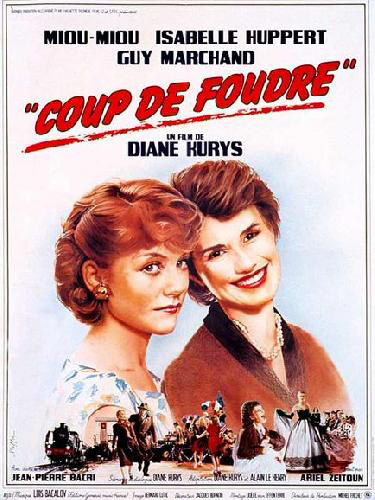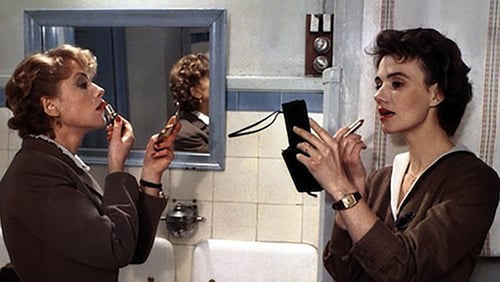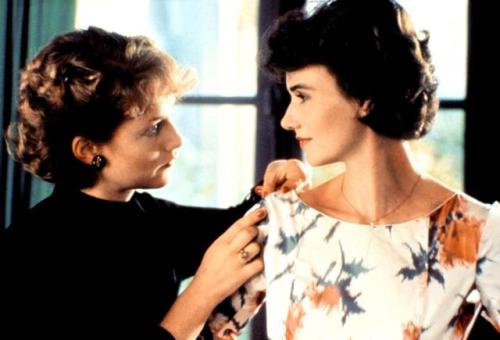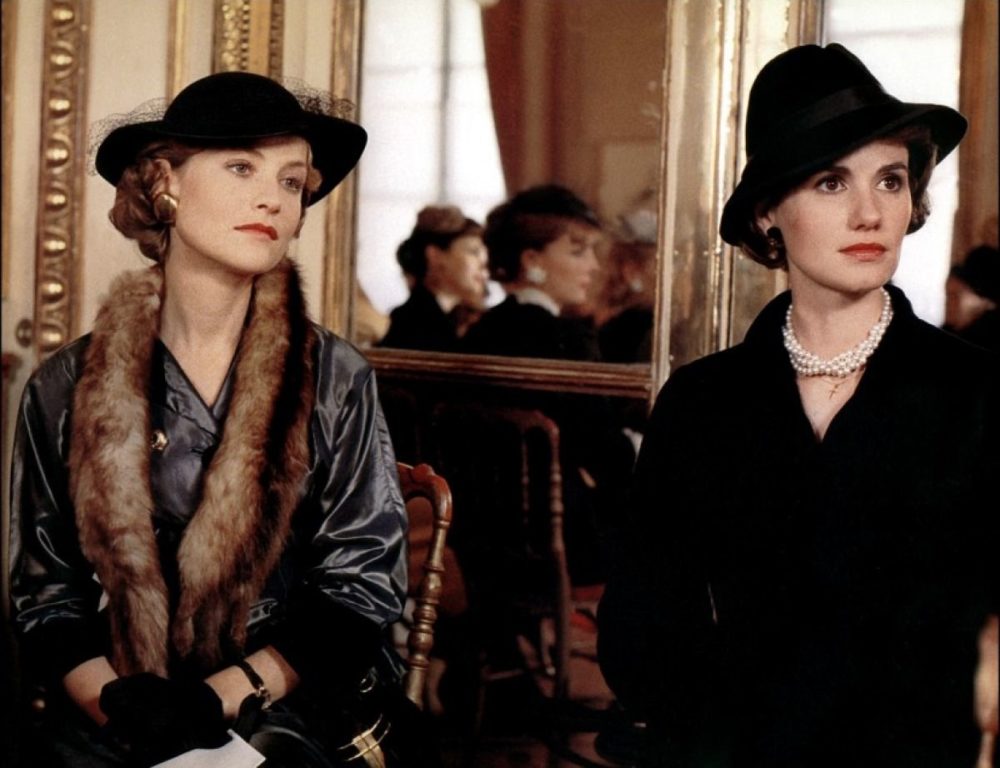We have added ‘Entre Nous’ to our list of Great Films.
Diane Kurys’s Entre Nous, a highlight of French cinema of the 1980s, is a personal and emotionally touching film, made very much in the vein of the earlier works of the French New Wave.

Director Kurys, who also co-wrote the script (with Alain Henry), tells the multi-layered story of two women who don’t recognize how unfulfilled they have been in their respective marriages until they meet each other.
Our Grade: A (***** out of *****)
The friendship between Madeleine (Miou-Miou) and Lena (Isabelle Huppert), which lasts for many years, is like a journey of the two femmes, taking twists and turns. It eventually threatens and destroys their respective marriages, which, for a change are to nice if ineffectual husbands.
While most of the yarn is set in the 1950s, it begins during WWII, with parallel tracks of the two women.
At first, Lena and Madeleine seem to be completely different, with no common interests or values. Lena is a Belgian Jew, who marries a guard to escape internment in a French prison camp during the Nazi occupation. In contrast, Madeleine is a high-strung, would-be artist, who marries a handsome wimp after her first husband is killed.
“Entre Nous” might be called feminist, but the film’s concerns are so much larger than those of any single cause or ideology that it has the qualities of an intimate epic, grounded in specific times and places.

Inspired by the compassionate tale of Kurys’s real-life mother, Entre Nous features two great performances by Isabelle Huppert and Miou Miou.
At the time, some critics objected to the narrow view of the heroines’ husbands, played Guy Marchand and Jean-Pierre Bacri in a wimpy (and sometimes jerky) way that makes it easier for the audience to root for the women. Other detractors charged that the story never made it clear whether the relationship was also sexual, though there are innuendos that it was quite intimate.
Among other qualities, the film is singular in depicting more or less stable marriages, in which the women feel that “something essential” is missing from the hetero bonds. It goes beyond sex and verbal communication–Lena and Madeleine can only be themselves–true to their inner selves–when they are together, when the husbands or children are not around. Which is the reasons why their characters are so humanly relatable to all women, both straight and gay.
Take the scene in which the two women dress in front of the mirror, each examining the reflection of herself as well as the other, and Lena says, after gazing at Madeline’s breasts, “Mine are too small.” It’s the kind of confession or acknowledgment that she would never make to her husband.
In this tale, it’s the husbands who are too conventional, wishing to have the stability of a bourgeois marriage, with regular, if unexciting sex. In one of many arguments, when Lena asks he husband what he wants, he says, “Peace, peace of mind.”
Later on, when Lena puts on a sexy black dress, her husband complains that it’s too tight (it is not) and that one can see her panty’s lines, which in his view makes her look like a prostitute. In response, Lena does not change her dress, but removes her panties, a defiant act which makes him all the more jealous.
Contesting gender stereotypes, In Entre Nous, it’s the men who are hapless when left on their own, get hysterical and angry (throwing and breaking stuff), burst into crying in public (when their wives declare their independence and asking for divorce).
There is a nice scene, set on a train, when Lena is gazed on by a solider, and she returns the gesture with a yearning gaze. One thing leads to another, and soon they are having passionate impersonal sex in their coach (it’s the kind f sex that in most Hollywood movies would not only be initiated by the men, but also rejected by women, even if they’re physically attracted to the gazing males).
Thematically, “Entre Nous” bears some resemblance to Ridley Scott’s 1991 movie, “Thelma and Louise,” which also centers on the deep, intimate bond between two women (Susan Sarandon and Geena Davis) to the exclusion of men–or life–for that matter, judging by the ending.
The original French title of “Entre Nous” is better and more accurate, “Coup De Foudre,” which translates into “Love at First Sight” (Unfortunately, in some U.S. circles, it is known as “At First Sight”)

“Entre Nous” was Oscar-nominated for the Best Foreign-Language Picture, but the winner was Ingmar Bergman’s “Fanny and Alexander.”

“Entre Nous” was Oscar-nominated for the Best Foreign-Language Picture, but the winner was Ingmar Bergman’s “Fanny and Alexander.”
Detailed Plot
The early scenes, set in 1942, epic Lena (Isabelle Huppert), a pretty 18-year-old, has been arrested and brought to an internment camp for Jews in the Pyrenees. One of the guards, Michel (Guy Marchand), warns her of deportation to a German Nazi camp, and offers her marriage as a means of escape, and she accepts.
During the ceremony she discovers that he too is Jewish and is dismayed that she won’t have the protection of a gentile name. But she has no choice and they hasten to the Italian border.
By 1952, the hardworking Michel owns a garage in Lyon, and they have two daughters. Lena meets Madeleine (Miou-Miou), at a school pageant. Madeleine, who comes from a moderately wealthy family, was an art student in 1942, and had married a fellow student who was killed in a street fight between the students and the collaborationist police.
A widow at 19, Madeleine drifted into marriage with an actor-black marketeer, Costa (Jean-Pierre Bacri), and now has a son at the school.
Gradually. the two women become inseparable, in one scene, sharing a bed (though there is no overt lesbian sexuality). They develop an intimacy based partly on their boredom with and dissatisfaction of their restrictive domestic chores.
Michel and Lena’s marriage is fractious, and though there are moments of happiness with their daughters, Lena Leaves him.
Meanwhile, Madeline had also left her husband, experienced trouble holding a steady job, and eventually goes through a nervous breakdown.
Ending on a positive note, however, the film concludes with Lena and Madeleine together, as they about to open a dress shop in Paris.
Oscar Nomination: 1
Best Foreign-Language Film
Oscar Context
In 1983, “Entre Nous” competed with “Fanny and Alexander” from Sweden, “Carmen” from Spain, “Job’s Revolt” from Hungary, and “Le Bal” from Algeria (but French-made).
Cast
Miou-Miou as Madeleine
Isabelle Huppert as Lena Weber
Guy Marchand as Michel Korski
Jean-Pierre Bacri as Costa Segara
Robin Renucci as Raymond
Patrick Bauchau as Carlier
Jacques Alric as Mr. Vernier
Jacqueline Doyen as Mme Vernier
Saga Blanchard as Sophie
Guillaume Le Guellec as René
Christine Pascal as Sarah
Corinne Anxionnaz as ‘unnamed’
Jacques Blal as Lionel Feldman
Bernard Cazassus as Le chef de gare
Gérard Chambre as Flirt
Credits
Directed by Diane Kurys
Produced by Ariel Zeitoun
Written by Olivier Cohen, Diane Kurys, Alain Le Henry
Music by Luis Enríquez Bacalov
Cinematography Bernard Lutic
Edited by Joële Van Effenterre
Distributed by Gaumont
Release date: April 6, 1983
Running time; 110 minutes











